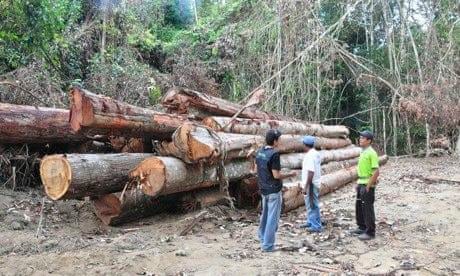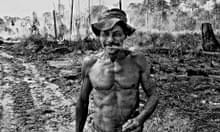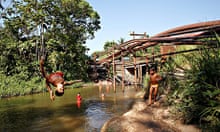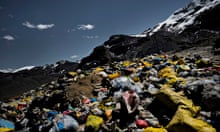Sister Angela Sauzen exudes energy and determination. A Brazilian nun of German extraction, she has made a real difference to progressive causes in Latin America over the past half-century. Peasant farmers laughingly say she never takes "no" for an answer.
When the Guardian met her in September, she was excited about a project she was helping peasant farmers to develop as an alternative to destructive slash-and-burn agriculture. Like the farmers, Sauzen was having to learn about budgets, quality control and marketing strategies – issues not generally covered in a nun's training. But she was not in the least daunted.
She lives in the hot, unpleasant town of Uruará, on the Transamazônica highway, which cuts through the Amazon basin from east to west. With some 50,000 inhabitants, it is a typical frontier town, with no running water, no sewerage, no internet, no airport (apart from several small, clandestine landing strips, some of which are said to be used for drug trafficking), not even a bus station.
What Uruará does have in abundance are loggers, who bring in most of the town's income and are clearly the powers that be. In the late afternoon, lorries transporting massive tree trunks arrive in the loggers' depots. Some of the lorries are new but, almost invariably, they don't have a number plate. It's a way the loggers have found to hide the origin of their timber so they can claim it comes from one of the few areas where logging is permitted. This scheme, known as heating the wood, is so common that, off the record, loggers admit it would be impossible to find a single logger who did not disguise the origin of at least part of his timber in this way.
The loggers take timber from wherever they can find it, including indigenous reserves and land allocated to peasant families as part of the government's agrarian reform programme. With the government largely absent from the region, they have used the classic combination of patronage (building roads, repairing bridges, taking sick people to hospital) and threats to get the peasant families to sell them their timber at peppercorn prices.
In 2007 Sauzen decided to do something to try to change the dynamic. "I came back to Uruará after a 12-year absence and I was horrified at the way logging and forest-felling had increased," she says. "I feared that the whole wonderful forest would be destroyed." She began to talk to the families about developing a sustainable way of earning their living. Some of them in a nearby settlement called Rio Trairão responded favourably, and Sementes da Floresta (Seeds of the Forest) was born.
A community leader, Derisvaldo Moreira, said the basic philosophy behind their project was to collect produce from the forest (Brazil nuts and seeds of the andiroba, cupuaçu, copaíba and other trees), process it and sell it to retailers and cosmetics manufacturers. None of the families had done anything like this before. Like Sauzen, they had a lot to learn, but little by little the project has been moving forward. Or it was.
There were signs in September 2012 that Seeds of the Forest was provoking fierce opposition from loggers and big landowners, particularly when it announced plans to incorporate, legally, a further 14,000 hectares (34,500 acres) of public forest.
The Guardian got a taste of the landowners' fury when a cattle farmer, Domingos Nicolodi, claimed to own 6,000 hectares of forest in the area claimed by Seeds of the Forest. When reminded that the constitutional limit on the area of public land that could be owned by an individual was 2,500 hectares, he reacted furiously. "That land is mine," he shouted. "All this trouble is being caused by that mad nun. That's what I call her, a mad nun. She should be praying in a church."
The situation has since become more tense. According to reports, labourers are illegally cutting down swaths of forest in the area used by the families. There have been death threats. Last month a masked man held a gun to Sauzen's head, warning her to back off. An activist secretly recorded an official from Ibama, the environmental agency, saying: "There's already a group trying to get us withdrawn. It's a powder keg here."
Every year scientists come up with evidence showing the importance of the Amazon forest in regulating global climate. Yet, after declining for several years, Amazon deforestation increased by 28% from August 2012 to July 2013, with 5,843 sq km (2,255 sq miles) being felled. It is clear that, if the devastation is to be permanently halted, projects such as the Seeds of the Forest must be provided with the protection they need to survive.
Further along the Transamazônica highway another Catholic nun – the American Sister Dorothy Stang – worked ceaselessly for peasant families. Just like Sauzen, she was helping them to develop a sustainable alternative to slash-and-burn farming. She was gunned down in January 2005 by an assassin, hired by a local landowner.





Comments (…)
Sign in or create your Guardian account to join the discussion